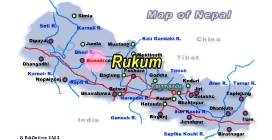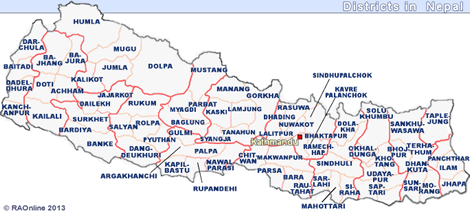|
Myagdi:
Police bear brunt in Nepal's war |
September
2004
| The
police station in Beni was attacked by thousands of Maoists |
In
Nepal's eight-year war with Maoist guerrillas, no group has been harder
hit than the police. They have lost more than 1,200 of their number. The
police consistently suffer more casualties than the army, who were not
used at all against the Maoists for the first five years of the conflict.
To
find out more about what the police have been through, BBC correspondent
Charles Haviland travelled to the isolated town of Beni, where memories
of a recent bloody ordeal are raw.
July
2004
| Sorry,
comrades, that is not how it happens |
In
recent times, our Maoist comrades have kept themselves busy with abductions
of teachers and students. Citizens have been marched off to the jungles
under the shadow of the gun where they have been indoctrinated in 'revolutionary
education' and then released in a seeming act of benevolence.
These
wholesale abductions are mainly restricted to hapless students and teachers
in remote schools. They are taken to unknown destinations and forced to
listen to harangues under the barrel of a gun.
July
2004
|
The
western Terai is now a Maoist stronghold |
| From
the hills to the plains |
In
the absence of government, the Maoists spread rapidly across the Terai.
In six short years, the western Terai is now a Maoist stronghold. Just
six km from Nepalganj in the town of Khajura, the Maoists held a three-hour
mass meeting on the evening of 18 June. About 300 armed rebels dressed
in combat fatigues marched openly down the streets of the town, barely
a few minutes drive from the regional army headquarters.
From
what could be seen in Khajura, Maoist morale is high and there is considerable
support for charismatic commanders like Nanda Kishore Pun (Pasang) who
led the Maoist raid on army bases in Beni in February and on Achham two
years ago.
July
2004
| Western
Nepal: Maoist's smuggling routes of weaponry (July
2004) |
The
combatants' current route for smuggling weapons and explosives from the
Indian border is as follows: from Belauri check-point of Kanchanpur district
via Jogbudha of Dadeldhura and Melauliat the border of Dadeldhura and Baitadi
districts, then to Bajura and finally to Achham. The Maoists are purchasing
explosives from lower-level staffers of the Dhauli Ganga hydro project
at Dharchula in India. The Maoists are also smuggling arms and explosives
from the Tibetan border via Jharganda and Taklakot. There is a high concentration
of Maoists in the remote Gokuleshwor, the area that borders Darchula and
Baitadi districts; Purchungehat and Kuwakot areas, bordering Bhajhang and
Baitadi; Ramaroshan and Binayak of Aachham district and Ghagal Khimadi,
the border of Doti and Kailali districts and Melauli.
July
2004
| Rukum:
Ather the sweep (July 2004) |
 |
Three
weeks after the army's operation, the Maoists are back in their strongholds
in midwestern Nepal. After its well-publicised sweep into the Maoist heartland
in June, the Royal Nepali Army has returned to its barracks. This was the
first major incursion of its kind into what the Maoists consider their
base area.
The
soldiers didn't see much action, and Rukum's CDO, Chet Prasad Upreti, said
this proved there is no Maoist stronghold in his district. Major MB Mahara
in Musikot agrees: "The Maoists did not even try to stop us. Whatever they
may say, they don't have any control."> |
The
locals know better. Three weeks after the army ended its operation, the
rebels are back in Rukumkot. "We knew the army was coming," Deepak, a Maoist
district committee member, tells us. "We hid in the jungle for a couple
of days while the soldiers searched the houses. When they left, we came
back."
July
2004
| "Please
tell the world about our suffering" (July 2004) |
Journalists
from western Nepal talk about the hardships they face in reporting from
the war zone.
Hundi
Rawat tells grieving relatives not to cry because the journalists
are here. Her widowed daughter is in the middle.
Sprawled
on the dirt outside her home, 56-year-old Hundi Rawat was weeping over
the bodies of her four relatives and two neighbours. All were gunned down
by an army patrol on the morning of 29 October 2002, when they were mistaken
for Maoists. By chance, three journalists from Kathmandu happened to be
passing by.
Most
of the villagers were too shocked to speak. Hundi noticed the presence
of the journalists and consoled the others: "Don't worry, stop crying,
they will take our news to the outside world."
Mohan
Mainali was one of the journalists, and still remembers being moved by
how much hope those without hope still have on the power of the media.
July
2004
| "Please
tell the world about our suffering" (July 2004) |
Journalists
from western Nepal talk about the hardships they face in reporting from
the war zone.
Hundi
Rawat (l, at right in pic) tells grieving relatives not to cry because
the journalists are here. Her widowed daughter is in the middle.
Sprawled
on the dirt outside her home, 56-year-old Hundi Rawat was weeping over
the bodies of her four relatives and two neighbours. All were gunned down
by an army patrol on the morning of 29 October 2002, when they were mistaken
for Maoists. By chance, three journalists from Kathmandu happened to be
passing by.
Most
of the villagers were too shocked to speak. Hundi noticed the presence
of the journalists and consoled the others: "Don't worry, stop crying,
they will take our news to the outside world."
Mohan
Mainali was one of the journalists, and still remembers being moved by
how much hope those without hope still have on the power of the media.
June
2004
| India:
Nepalese Maoists' plans in India (June 2004) |
As
the chaos caused by Maoist insurgency in rural Nepal and demand for the
restoration of democracy in urban areas continues to plague the county,
and as attacks on Indian properties and interests continue, political and
diplomatic observers in Delhi have begun debating earnestly whether India
should assert itself more forcefully and even consider military intervention
as it did in what was then East Pakistan (now Bangladesh) in 1971 and Sri
Lanka in 1987. This is an alarmist scenario for some, but many think it
should not be ruled out in the eventuality of the situation further deteriorating
and particularly if refugees start streaming across Nepal's borders into
Indian territory.
Nepalese
Maoists have developed close ties with Maoists and other extreme communist
groups called Naxalites in India. Their ties with People's War Group of
Andhra Pradesh, Maoist Communist Center of Bihar and Jharkhand, and the
Communist Party of India [Marxist-Leninist] are said to be particularly
strong. These extremists have been running virtually parallel administrations
in the rural hinterland in Indian states
May
2004
| Listening
the Maoist Radio |
This
article describes the program of FM radio operated by Maoist rebels in
Nepal under a very difficult and dangerous conditions. As they want to
change the kingdom into a republican state, they are facing a brutal repression
from state army. This one day's radio program gives insight into what message
they want to convey to people.
I
had been to East Nepal in December, 2004 to give training to grassroots
development workers on food security, who were working in remote and inaccessible
villages which are under direct influence of Maoist rebels waging a war
since 1995 to bring political change in Nepal. After two days of interaction
and socialization the development workers told me that they listen to Maoist's
radio whenever they have the chance. They need to listen to this program
in order to know their activities and persons who take the responsibility
of local governance. In some events, they need to contact those leaders,
which they usually do, to smoothly run the programs and develop a social
network in case they face troubles.
top
|







